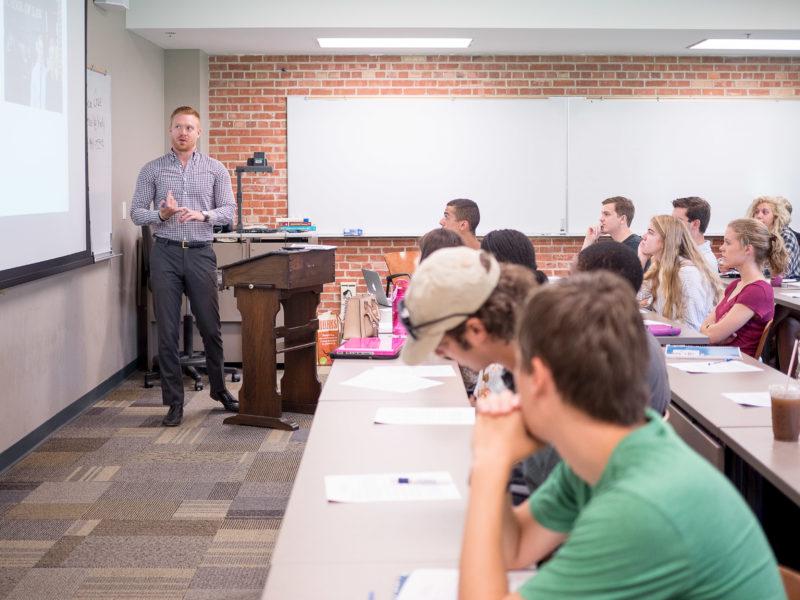Jeremy Allen, Greek life coordinator, will take over the position of Constitutional Law professor. John Hermann, professor of political science, will not be teaching the course this semester.
Allen, who usually works with students outside of an academic setting in Student Involvement, is excited to get to know students inside the classroom.
“I think having relationships with students is crucial, regardless of what capacity you serve on campus. Having those relationships with students inside the classroom is just as important as those outside of it. It’s important to have that relationship so that they’re not afraid to ask questions, come to office hours. I think it’s all about the relationship and the collaboration between staff, faculty, student; I think that’s really where a lot of the learning happens,” Allen said.
Allen said he hopes this move helps demonstrate the importance of academics and its role as the primary job of the student.
“Academics is a strong part of Greek life here; scholarship is one of our four pillars. We talk about the importance of academics all the time with Greek Council and Greek students. I think, in a way, this kind of reinforces the message that we’ve talked about for the past year as a community, saying we want to pride ourselves on being the best and brightest at Trinity, and that’s what every student should strive for, regardless of their affiliation. So I think being able to get involved with students taking this Constitutional Law class through that academic context is going to be really exciting and challenging,” Allen said.
Christiana Ellard, sophomore and member of Sigma Theta Tau, thinks that Allen’s new position will showcase many of the positive aspects of Greek life.
“Some people assume that Greek life puts everyone in one box, or one category, and I think that this emphasizes that it can really help people expand socially and academically, and shows that it can help in many different aspects of life. To teach, for instance, you have to have good communicative skills, and the ability to connect with people. So it goes to show that Greek life can teach you to do all of the above things and be successful as well,” Ellard said.
Hermann, who will only be teaching a First Year Experience (FYE) course, said he is confident Allen is ready to teach the course.
“When I was asked to teach this [FYE], they asked how much ownership I had over my classes, and I think that’s a terrible way of putting it. I think everyone at Trinity, whether we like it or not, we’re replaceable. The person that’s teaching it for me, Jeremy Allen, he has two really good qualities that I don’t have. He did Teach for America, and he taught in the inner city of New York City. And the second thing he did that was really phenomenal is that he went to law school; I don’t have a J.D. So he’s going to teach it with memorandum and do things that I may not do because I teach it more like a political scientist would. So I think Jeremy Allen can step up and do great things with this. I’m excited,” Hermann said.
Allen said his goal for the course is to make it as similar to a law school course as possible. This includes teaching students how to brief a case, write legal memorandums, and answer questions based on the Socratic method.
“I want students to be able to see what a law school course looks like, so that’s what we’re going to try and replicate. It’s going to be as close as we can get to a real law class through the assignments, through the content, through how the class is conducted, and I think that really helps reinforce that scholarship pillar even further,” Allen said.
The class itself will remain largely unchanged because of the importance of the course material to students taking the class. Allen said he will use a nearly identical syllabus to the one Hermann created
“I think Dr. Hermann has done a tremendous job building that class into what it’s become: a class that students are eager to take. It’s a full course, students are on the waitlist, and I think that speaks to how well Dr. Hermann has been able to build that. So the vast majority of the content, the cases that we discuss, will be about 95 percent the same as what has been on the previous syllabus,” Allen said.
The course is designed to teach students critical thinking and problem solving skills that Allen believe are crucial parts of a legal education.
“I think having students understand the importance of being prepared and being able to think on their toes is extremely important,” Allen said. “A big chunk of law school is having students think like a lawyer. You’re never going to know the entirety of all the laws, but if you’re able to think like a lawyer, you can find that information and find a solution to the problem, and be creative with your problem solving skills.”
Allen will continue his duties as Greek life coordinator while he teaches the course throughout the semester.







